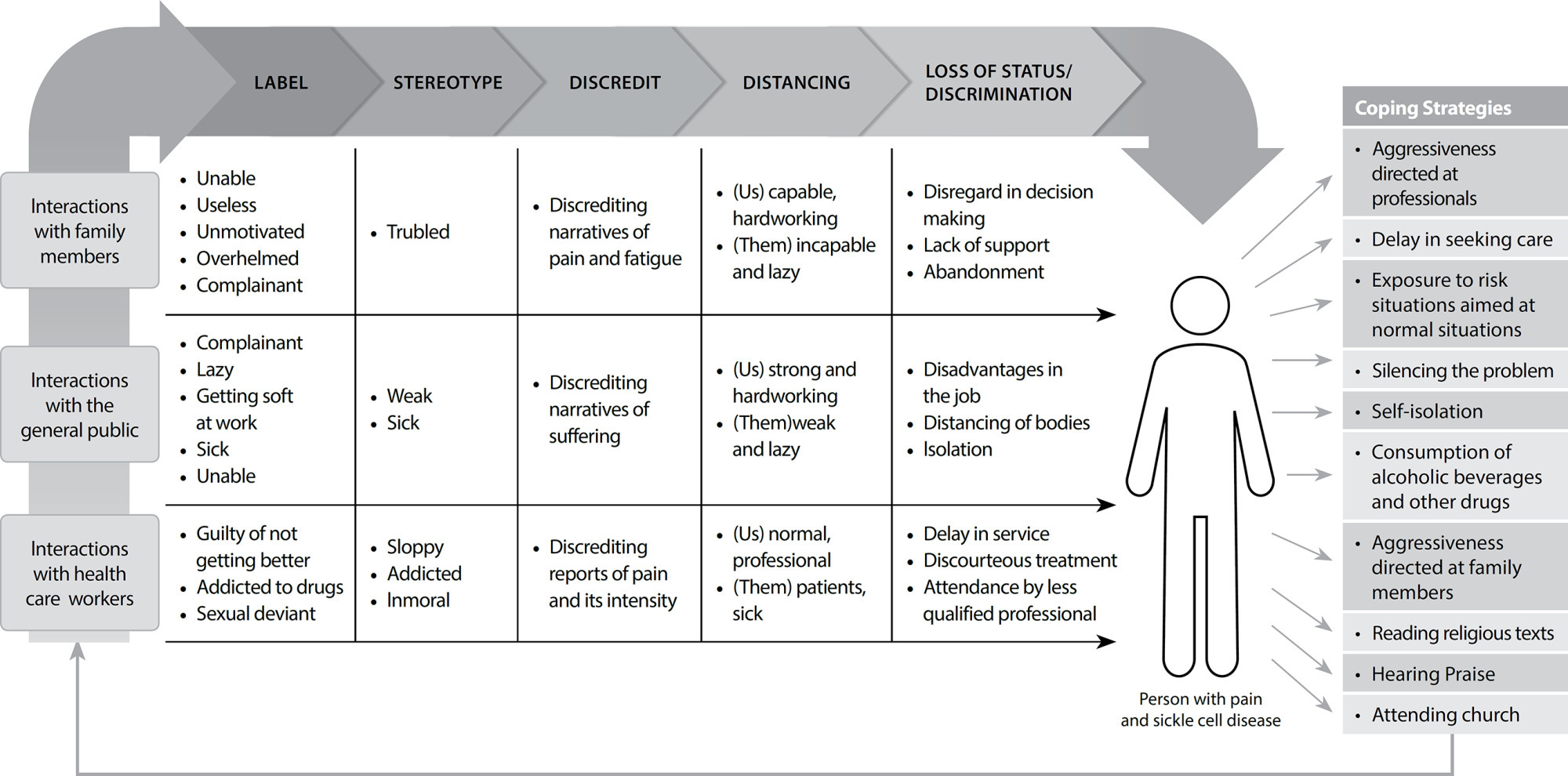-
REVIEW
Telenursing in the postoperative period: a scoping review
Revista Brasileira de Enfermagem. 2024;77(3):e20240066
07-29-2024
Abstract
REVIEWTelenursing in the postoperative period: a scoping review
Revista Brasileira de Enfermagem. 2024;77(3):e20240066
07-29-2024DOI 10.1590/0034-7167-2024-0066
Views0See moreABSTRACT
Objectives:
to map available evidence on telenursing use in the postoperative period and its impact on patient outcomes.
Methods:
a scoping review, conducted according to the JBI model and the PRISMA-ScR checklist. The search was carried out in the CINAHL, Embase, LILACS, PubMed, Web of Science, SciELO, Scopus and Cochrane Library databases.
Results:
twelve studies were included, published between 2011 and 2023, 66.6% of which were in developed countries. Of the positive outcomes, we highlight improved levels of disability, autonomy and quality of life, lower rates of post-operative complications, pain and reduced costs. Telephone monitoring was the most widely used modality, but there were few studies in the pediatric context and in Brazil.
Conclusions:
of the studies, 11 (91.6%) identified at least one positive outcome in telenursing use and none showed negative aspects in the postoperative period. The role of nurses in digital health needs further study.

-
ORIGINAL ARTICLE
Sexual counseling for people with acute coronary syndrome: educational video development
Revista Brasileira de Enfermagem. 2024;77(3):e20230416
07-29-2024
Abstract
ORIGINAL ARTICLESexual counseling for people with acute coronary syndrome: educational video development
Revista Brasileira de Enfermagem. 2024;77(3):e20230416
07-29-2024DOI 10.1590/0034-7167-2023-0416
Views0See moreABSTRACT
Objective:
to assess validity evidence of an educational video on safe sexual activity after acute coronary syndrome.
Method:
study in three phases: video development; content validity analysis by 11 experts; and analysis of validity based on response processes by seven people with coronary disease. The content validity ratio (CVR) was calculated with critical values for the second phase of 0.63 and for the third of 1.0.
Results:
the video addressed the importance of resuming sexual activity and positions that consume less energy, clinical warning signs, the importance of adhering to treatment and a welcoming environment for sexual practice. A CVR above the critical value was obtained with a total of 4 minutes and 41 seconds.
Conclusion:
the educational video brings together adequate content validity evidence and can be used as a tool for patients after acute coronary syndrome.
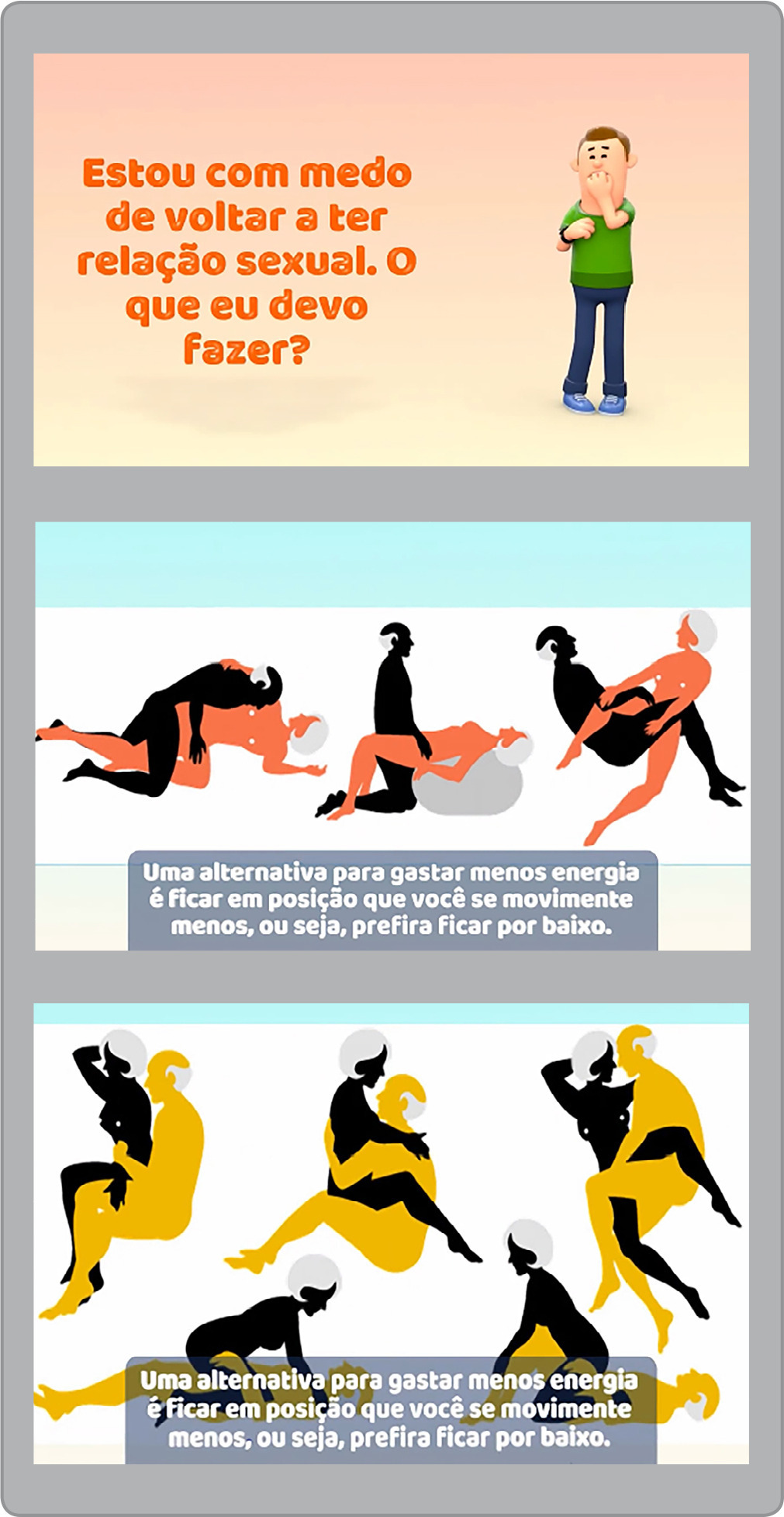
-
ORIGINAL ARTICLE
Evaluation of software technical quality for collecting data from patients under palliative care
Revista Brasileira de Enfermagem. 2024;77(3):e20230435
07-29-2024
Abstract
ORIGINAL ARTICLEEvaluation of software technical quality for collecting data from patients under palliative care
Revista Brasileira de Enfermagem. 2024;77(3):e20230435
07-29-2024DOI 10.1590/0034-7167-2023-0435
Views0See moreABSTRACT
Objectives:
to evaluate software technical quality for collecting data from patients under palliative care.
Methods:
this is methodological technology evaluation research, according to the technical standard International Organization for Standardization/International Electrotechnical Commission 25040-2011, developed from August 2021 to August 2023. Eight nurses and eight information technology professionals participated as judges, who evaluated six quality characteristics and 23 subcharacteristics. Items that reached a percentage of agreement greater than 70% were considered suitable.
Results:
the characteristics evaluated by nurses/information technology professionals received the following percentages of agreement, respectively: functional suitability (94%-84%); reliability (100-70%); usability (89.9-66.8%); performance efficiency (95.8%-86.1%); compatibility (95.8-79.6%); and safety (96%-83.4%).
Conclusions:
the software was considered suitable in quality evaluation to offer support to nurses in collecting patient data under palliative care, with the potential to operationalize the first Nursing Process stage.
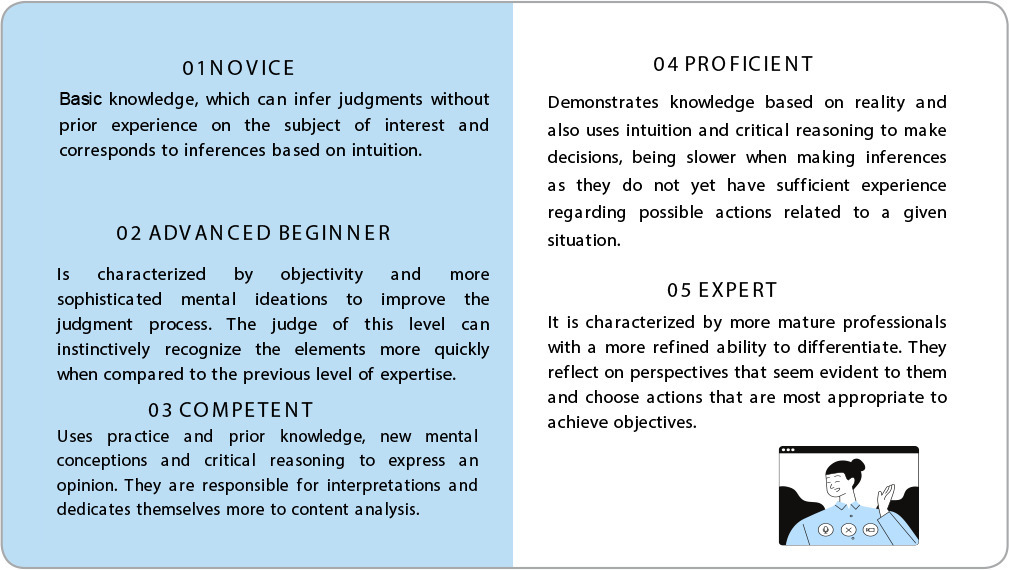
-
ORIGINAL ARTICLE
Mental health of parents of children and adolescents who require special health care
Revista Brasileira de Enfermagem. 2024;77(3):e20230457
07-29-2024
Abstract
ORIGINAL ARTICLEMental health of parents of children and adolescents who require special health care
Revista Brasileira de Enfermagem. 2024;77(3):e20230457
07-29-2024DOI 10.1590/0034-7167-2023-0457
Views0See moreABSTRACT
Objective:
To identify the manifestations presented by parents of children and adolescents who require special health attention that can impact their mental health.
Methods:
exploratory, qualitative research, based on the concept of vulnerability, with data collection carried out through interviews with 18 parents of children and adolescents with special health care needs, hospitalized in the pediatric ward of a hospital in Paraná, between May/2017 and May/ 2018. Data analyzed by inductive thematic analysis.
Results:
parents experienced situations of vulnerability when providing care at home, with repercussions on their mental health, expressed by manifestations of lack of protection, anxiety and depression.
Final considerations:
It is important that health professionals seek to expand actions to promote care and reduce situations that generate threats, insecurities, concerns and damage to the health of parents, which can impact and further weaken care for children and adolescents who need attention especially health.
-
ORIGINAL ARTICLE
Disrupted mother-fetus dyad risk in high-risk pregnancies: a Middle-Range Theory
Revista Brasileira de Enfermagem. 2024;77(3):e20230464
07-29-2024
Abstract
ORIGINAL ARTICLEDisrupted mother-fetus dyad risk in high-risk pregnancies: a Middle-Range Theory
Revista Brasileira de Enfermagem. 2024;77(3):e20230464
07-29-2024DOI 10.1590/0034-7167-2023-0464
Views0See moreABSTRACT
Objectives:
to develop and evaluate a Middle-Range Theory for the nursing diagnosis “Disrupted Mother-Fetus Dyad Risk” in high-risk pregnancies.
Methods:
this methodological study was conducted in two stages: theory development and evaluation. Dorothea Orem’s General Nursing Model was used as the theoretical-conceptual foundation. Evaluation was conducted using the Delphi method with seven judges, and consensus was achieved when the Content Validity Index of the evaluated items was ≥ 0.80.
Results:
the theory identified 20 elements of the nursing diagnosis “Disrupted Mother-Fetus Dyad Risk” (10 risk factors, 4 at-risk populations, and 6 associated conditions), 14 propositions, and 1 pictogram. After two rounds of evaluation, the theory was considered consistent, with consensus reached for all items, each achieving a Content Validity Index ≥ 0.80.
Conclusions:
the Middle-Range Theory included biopsychosocial factors explaining the nursing phenomenon “Disrupted Mother-Fetus Dyad Risk,” which aids in nurses’ diagnostic reasoning.
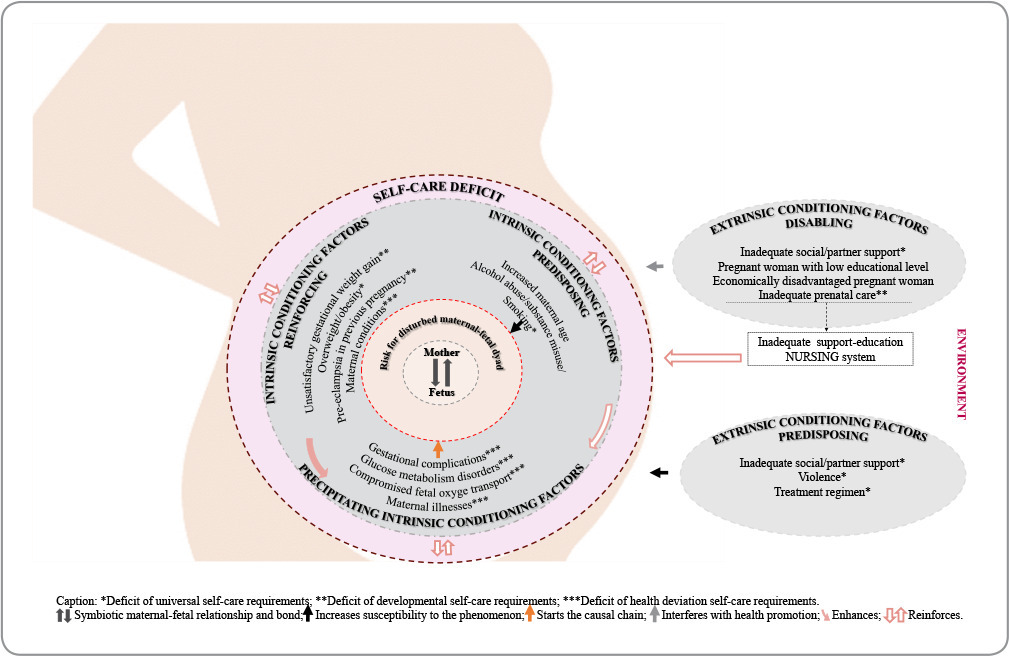
-
ORIGINAL ARTICLE
Completeness of variables in Hospital-Based Cancer Registries for prostatic malignant neoplasm
Revista Brasileira de Enfermagem. 2024;77(3):e20230467
07-29-2024
Abstract
ORIGINAL ARTICLECompleteness of variables in Hospital-Based Cancer Registries for prostatic malignant neoplasm
Revista Brasileira de Enfermagem. 2024;77(3):e20230467
07-29-2024DOI 10.1590/0034-7167-2023-0467
Views0See moreABSTRACT
Objectives:
to analyze the completeness of variables from Hospital-Based Cancer Registries of cases of prostate neoplasm in the Oncology Care Network of a Brazilian state between 2000 and 2020.
Methods:
an ecological time series study, based on secondary data on prostate cancer Hospital-Based Cancer Registries prostate. Data incompleteness was classified as excellent (<5%), good (between 5%-10%), fair (10%-20%), poor (20%-50%) and very poor (>50%), according to the percentage of lack of information.
Results:
there were 13,519 cases of prostate cancer in the Hospital-Based Cancer Registries analyzed. The variables “family history of cancer” (p<0.001), “alcoholism” (p<0.001), “smoking” (p<0.001), “TNM staging” (p<0.001) had a decreasing trend, while “clinical start of treatment” (p<0.001), “origin” (p=0.008) and “occupation” (p<0.001) indicated an increasing trend.
Conclusions:
most Hospital-Based Cancer Registries variables showed excellent completeness, but important variables had high percentages of incompleteness, such as TNM and clinical staging, in addition to alcoholism and smoking.
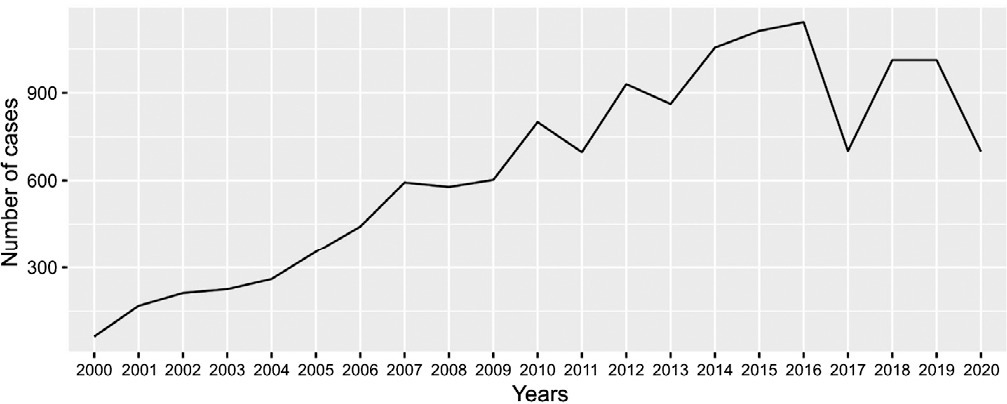
-
ORIGINAL ARTICLE
Contribution of informal caregivers to self-care in individuals with heart failure
Revista Brasileira de Enfermagem. 2024;77(3):e20230492
07-29-2024
Abstract
ORIGINAL ARTICLEContribution of informal caregivers to self-care in individuals with heart failure
Revista Brasileira de Enfermagem. 2024;77(3):e20230492
07-29-2024DOI 10.1590/0034-7167-2023-0492
Views0See moreABSTRACT
Objectives:
to evaluate the contribution of informal caregivers to the self-care of individuals with heart failure.
Methods:
a cross-sectional study was conducted with 87 caregivers from March to October 2022 in the city of João Pessoa/PB. The caregivers’ contribution was assessed using the Caregiver Contribution to Self-Care of Heart Failure Index instrument. Scores ≥ 70 points indicate adequate contribution. Data were analyzed using descriptive statistics and Spearman’s correlation.
Results:
the sample consisted of 81.6% female caregivers. Median scores obtained for the self-care contribution scales were: 63.3 for maintenance; 55.5 for management; and 66.6 for confidence. Caregivers never or rarely recommended monitoring body weight, regular physical exercise, extra use of diuretics, and fluid restriction.
Conclusions:
informal caregivers showed inadequate contribution in the areas of maintenance, management, and confidence in self-care of individuals with heart failure.
-
REVIEW
Profile of scientific production on nursing technology construction, validity and application: a bibliometric study
Revista Brasileira de Enfermagem. 2024;77(3):e20230452
07-29-2024
Abstract
REVIEWProfile of scientific production on nursing technology construction, validity and application: a bibliometric study
Revista Brasileira de Enfermagem. 2024;77(3):e20230452
07-29-2024DOI 10.1590/0034-7167-2023-0452
Views0See moreABSTRACT
Objective:
to analyze the profile of scientific production on nursing technology construction, validity and application.
Methods:
this is a bibliometric study, carried out in six databases, based on the Methodi Ordinatio application, arranged in nine stages. To represent the findings, the VOSviewer® software was used.
Results:
346 studies were identified, obtained from BDENF, CINAHL, EMBASE, LILACS, PubMed/MEDLINE, Scopus and Web of Science. There was a predominance of the English language, and 20% of the authors hold more than 25% of studies. Only two journals account for 25% of studies in the period studied. Twenty-six studies were selected for the InOrdinatio classification. Nursing Process (23%) stood out among the studies. The most produced technology was software (27%), and 50% of works describe construction and validity.
Conclusions:
there is an emphasis on the creation of educational technologies, especially information technology. The data demonstrates opportunities for future research in the area.

-
ORIGINAL ARTICLE
Nurses’ performance in palliative care: spiritual care in the light of Theory of Human Caring
Revista Brasileira de Enfermagem. 2022;75(1):e20210029
09-24-2022
Abstract
ORIGINAL ARTICLENurses’ performance in palliative care: spiritual care in the light of Theory of Human Caring
Revista Brasileira de Enfermagem. 2022;75(1):e20210029
09-24-2022DOI 10.1590/0034-7167-2021-0029
Views0See moreABSTRACT
Objectives:
to analyze nurses’ role in assisting patients in palliative care, with emphasis on the spiritual dimension, in the light of Theory of Human Caring.
Methods:
this is an exploratory, qualitative study, carried out in a hospital in João Pessoa, Paraíba, between August and December 2019, with 10 nurses. For data collection, semi-structured interviews were used. For analysis, we opted for content analysis.
Results:
the spiritual dimension of care is contemplated by several religious and spiritual practices. These are respected and encouraged by nurses, although there is difficulty in providing care for the spiritual dimension.
Final Considerations:
nurses have attitudes consistent with Jean Watson’s Theory and apply the Caritas Process elements during assistance to patients’ spiritual dimension in palliative care.
-
ORIGINAL ARTICLE
Manchester Triage System: assessment in an emergency hospital service
Revista Brasileira de Enfermagem. 2021;74(3):e20201361
07-14-2021
Abstract
ORIGINAL ARTICLEManchester Triage System: assessment in an emergency hospital service
Revista Brasileira de Enfermagem. 2021;74(3):e20201361
07-14-2021DOI 10.1590/0034-7167-2020-1361
Views0ABSTRACT
Objectives:
to analyze demographic data, clinical profile and outcomes of patients in emergency services according to Manchester Triage System’s priority level.
Methods:
a cross-sectional, analytical study, carried out with 3,624 medical records. For statistical analysis, the Chi-Square Test was used.
Results:
white individuals were more advanced in age. In the red and white categories, there was a higher percentage of men when compared to women (p=0.0018) and higher prevalence of personal history. Yellow priority patients had higher percentage of pain (p<0.0001). Those in red category had a higher frequency of altered vital signs, external causes, and death outcome. There was a higher percentage of exams performed and hospitalization in the orange category. Blue priority patients had a higher percentage of non-specific complaints and dismissal after risk stratification.
Conclusions:
a higher percentage of altered vital signs, number of tests performed, hospitalization and death were evidenced in Manchester protocol’s high priority categories.
Keywords:Emergency NursingEmergency Service, HospitalOutcome and Process Assessment (Health Care)TriageVital SignsSee more -
ORIGINAL ARTICLE
Quality of life at work in a central sterile processing department
Revista Brasileira de Enfermagem. 2020;73(2):e20180792
03-09-2020
Abstract
ORIGINAL ARTICLEQuality of life at work in a central sterile processing department
Revista Brasileira de Enfermagem. 2020;73(2):e20180792
03-09-2020DOI 10.1590/0034-7167-2018-0792
Views0See moreABSTRACT
Objectives:
to evaluate the quality of life of nursing professionals who work in a central sterile processing department.
Methods:
a descriptive, quantitative, exploratory study, conducted with 82 nursing professionals working in the Central Sterile Processing Department of a University Hospital, from September to November 2017. A semi-structured instrument and the questionnaire “Medical Outcomes Study Short-Form 36” were used. Results: most of the participants were female, married, aged 31-40 years; 47.6% with 6-10 years of profession, and 82.9% reported working in CSPD for 1-5 years. The most affected quality of life domains were Pain, Vitality, General Health Status and Social Aspects.
Conclusions:
This study showed a need for rethinking and re-creating the labor dynamics in CSPD to improve the quality of life of these nursing professionals.
-
ORIGINAL ARTICLE
Trend of transplants and organ and tissue donations in Brazil: a time series analysis
Revista Brasileira de Enfermagem. 2021;74(1):e20200058
03-03-2021
Abstract
ORIGINAL ARTICLETrend of transplants and organ and tissue donations in Brazil: a time series analysis
Revista Brasileira de Enfermagem. 2021;74(1):e20200058
03-03-2021DOI 10.1590/0034-7167-2020-0058
Views0See moreABSTRACT
Objectives:
to indentify the time trend of rates of organs and tissues effective donors, of reports and types of transplanted organs per million people of the Brazilian population.
Methods:
ecological study, of time series, about reports of organ donations and on transplants. The data were provided by the Registro Brasileiro de Transplantes and analyzed using polynomial regression.
Results
an increasing trend was found for potential donors and effective donors, with an average increase of 2.33 and 0.92 per year, respectively. The South Region had the highest rate of potential donors (83.8) and effective donors (34.1) and the North Region, the lowest rate (20.2 and 3.9). The family refusal was the main obstacle to accomplish the donation.
Conclusions
the results show an increasing trend of potential donors and effective donors throughout Brazil, with emphasis on the southern region of the country. Among the main reasons for non-donation, it is worth emphasizing family refusal and medical contraindication prescription.
-
Coping strategies, concerns, and habits of Brazilian men in the COVID-19 context
Revista Brasileira de Enfermagem. 2021;74:e20210040
07-12-2021
Abstract
Coping strategies, concerns, and habits of Brazilian men in the COVID-19 context
Revista Brasileira de Enfermagem. 2021;74:e20210040
07-12-2021DOI 10.1590/0034-7167-2021-0040
Views0See moreABSTRACT
Objective:
To describe coping strategies, concerns and habits of Brazilian men during the COVID-19 pandemic.
Method:
Cross-sectional, descriptive and nationwide study, carried out in 2020 with a total of 1015 men living in Brazil. A descriptive statistic was used.
Results:
Young (41.2%), black (61.4%), highly educated (66.8%), high income (33.2%), living with family/friends (49.7%) and formal workers (65.6%) predominated. As coping strategies predominated: exclusive use of the private health system (36.4%), support from family/friends (78.2%) and leisure (97.7%) and domestic activities (64.9 %). Social distancing (59.7%), economic (58.0%) and work situations (44.4%) were the main reasons for concern. Among the prevention/control attitudes, hand washing (94.3%) and social distancing (91.0%) prevailed. Media consumption (84.6%) and health risk (65.4%) were the main increased habits.
Conclusion:
Brazilian men adopted coping strategies recommended by health authorities, with concerns and habits of potential risk to physical and mental health.
-
ORIGINAL ARTICLE
Self-medication practices in riverside communities in the Brazilian Amazon Rainforest
Revista Brasileira de Enfermagem. 2020;73(5):e20190432
07-08-2020
Abstract
ORIGINAL ARTICLESelf-medication practices in riverside communities in the Brazilian Amazon Rainforest
Revista Brasileira de Enfermagem. 2020;73(5):e20190432
07-08-2020DOI 10.1590/0034-7167-2019-0432
Views0INTRODUCTIONThe Brazilian Amazon rainforest has an area of approximately 5 million km2, with important climatic, social and economic variations that can impact the profile of morbidity and the use of medicines. The epidemiological profile of the Amazonian population is quite heterogeneous, including vector-borne diseases, such as malaria, dengue, cutaneous leishmaniasis and Diseases Related to Inadequate […]See more -
ORIGINAL ARTICLE
Occupational stress of nurses from the Mobile Emergency Care Service
Revista Brasileira de Enfermagem. 2020;73:e20180898
06-01-2020
Abstract
ORIGINAL ARTICLEOccupational stress of nurses from the Mobile Emergency Care Service
Revista Brasileira de Enfermagem. 2020;73:e20180898
06-01-2020DOI 10.1590/0034-7167-2018-0898
Views0See moreABSTRACT
Objective:
To evaluate stress, and to associate it with sociodemographic and clinical aspects of nurses from the Mobile Emergency Care Service.
Method:
This is an observational, cross-sectional and quantitative study conducted with 123 nurses, who answered a questionnaire to assess sociodemographic and clinical variables, and the Job Stress Scale, which evaluates stress in the workplace.
Results:
The results indicated that most of them were women, 20 to 40 years old, married, without another employment bond and with specialization course. They had low control and low demand at work and performed a passive work. Women reported passive work and high stress levels, while men were equally divided in active and passive work with low stress levels.
Conclusion:
Passive work is harmful to health and it is related to lack of autonomy, decision-making, and social support. It may lead to reduced ability to solve problems faced in daily work routine.
Search
Search in:
Nuvem de Tags
Aged (144) Atenção Primária à Saúde (239) COVID-19 (104) Cuidados de Enfermagem (269) Educação em Enfermagem (151) Educação em Saúde (139) Enfermagem (930) Estudos de Validação (131) Health Education (144) Idoso (208) Mental Health (149) Nursing (987) Nursing Care (306) Patient Safety (151) Primary Health Care (284) Qualidade de Vida (104) Quality of Life (106) Saúde Mental (145) Segurança do Paciente (150) Validation Studies (108)




